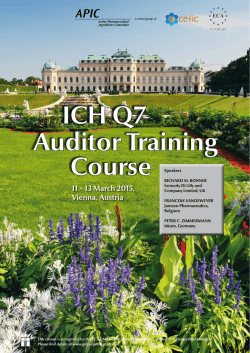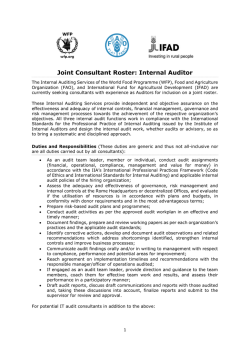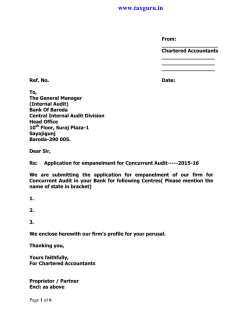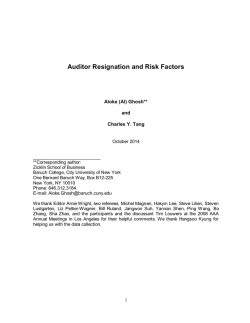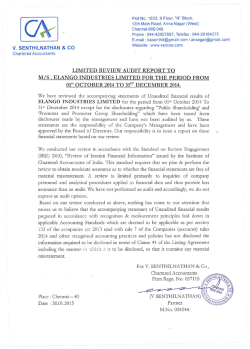
IFAC Normal Template
Auditor Reporting on Going Concern January 30, 2015 This publication has been prepared by the Auditor Reporting Implementation Working Group. It does not constitute an authoritative ® pronouncement of the International Auditing and Assurance Standards Board (IAASB) nor does it amend or override the International Standards on Auditing™ (ISAs™). Further, this publication is not meant to be exhaustive and reading this publication is not a substitute for reading the ISAs. The topic of going concern is of significant interest in light of the global financial crisis. Stakeholders have called for increased focus on going concern matters by management and auditors. The IAASB’s work on the topic of going concern has sought to respond to the call for greater focus on going concern in light of its remit as the global auditing standard setter. However, many stakeholders, including members of the international regulatory community, are of the view that a more holistic approach to going concern is necessary. In particular, feedback to the IAASB has highlighted that there are some underlying accounting issues, including a lack of consistent understanding of certain concepts, for which clarification or additional guidance from the accounting standard setters is necessary to complement the IAASB’s efforts on auditor reporting on going concern. Some have suggested a need to revisit the financial reporting requirements, questioning the adequacy and timeliness of management’s disclosures about going concern. There is also a concern that auditor statements on going concern could serve to widen the expectations gap if users did not understand that such statements were not a guarantee as to the entity’s future viability, or if the meaning of the term “material uncertainty” and the requirements for disclosure of such uncertainties were not clearly defined across different financial reporting frameworks. The IAASB has brought these views to the International Accounting Standards Board’s (IASB) attention as a matter of public interest. How the Auditor’s Report Will Address Going Concern The IAASB has sought to find an appropriate balance between entity-specific information about the auditor’s findings with respect to going concern and more standardized language describing how the auditor approaches going concern in an audit. The IAASB has therefore made revisions to ISA 700, Forming an Opinion and Reporting on Financial Statements, to enhance the communications about going concern in the auditor’s report, as well as certain revisions to ISA 570, Going Concern,1 regarding the auditor’s related work effort. The table on the following page is intended to illustrate what may be found in an auditor’s report relating to going concern depending on the facts and circumstances of the entity. 2 1 ISA 570 (Revised) is intended to be a framework-neutral standard, capable of application not only when the financial statements are prepared in accordance with International Financial Reporting Standards (IFRSs), but also with other financial reporting frameworks (such as national frameworks or those set out in law or regulation). 2 As described in paragraphs A51–A52 of ISA 200, Overall Objectives of the Independent Auditor and the Conduct of an Audit in Accordance with International Standards on Auditing, the potential effects of inherent limitations on the auditor’s ability to detect material misstatements are greater for future events or conditions that may cause an entity to cease to continue as a going concern. The auditor cannot predict such future events or conditions. Accordingly, the absence of any reference to a material uncertainty about the entity’s ability to continue as a going concern in an auditor’s report cannot be viewed as a guarantee about the entity’s ability to continue as a going concern. In all auditor’s reports A new description of management’s responsibility for assessing the entity’s ability to continue as a going concern and whether the use of the going concern basis of accounting is appropriate, as well as disclosing, if applicable, matters relating to going concern. The explanation of management’s responsibility for this assessment includes a description of when the use of the going concern basis of accounting is appropriate. This description is intended to be tailored to the requirements of the applicable financial reporting framework relating to going concern. A new statement that the auditor’s responsibilities are to conclude on the appropriateness of management’s use of the going concern basis of accounting and, based on the audit evidence obtained, whether a material uncertainty exists related to events or conditions that may cast significant doubt on the entity’s ability to continue as a going concern. If the auditor concludes that a material uncertainty exists, the auditor is required to draw attention in the auditor’s report to the related disclosures in the financial statements or, if such disclosures are inadequate, to modify the opinion. The auditor’s conclusions are based on the audit evidence obtained up to the date of the auditor’s report. However, future events or conditions may cause an entity to cease to continue as a going concern. This statement will be standardized in all auditor’s reports when ISA 570 (Revised) applies. (See paragraphs 33(b) and A43, and paragraph 38(b)(iv), respectively, as well as the Appendix of ISA 700 (Revised).) If the use of the going concern basis of accounting is inappropriate If the financial statements have been prepared using the going concern basis of accounting but, in the auditor’s judgment, management’s use of the going concern basis of accounting in the preparation of the financial statements is inappropriate, the auditor’s report will include: (See paragraphs 21 and A26–A27 of ISA 570 (Revised).) An adverse opinion, positioned as the first section of the auditor’s report3 A description of this circumstance in the Basis for Adverse Opinion section When the Use of the Going Concern Basis of Accounting Is Appropriate but a Material Uncertainty Exists Relating to Events or Conditions that May Cast Significant Doubt on an Entity’s Ability to Continue as a Going Concern Disclosures in the financial statements are adequate4 An unmodified opinion A section with a new required heading “Material Uncertainty Related to Going Concern” (unless law or regulation prescribe a different heading) (See paragraph 22, as well as Illustration 1 in the Appendix of ISA 570 (Revised)) Reference to the note in the financial statements that describes the material uncertainty A statement that these events or conditions indicate that a material uncertainty exists that may cast significant doubt on the entity’s ability to continue as a going concern and that the auditor’s opinion is not modified in respect of the matter Disclosures in the financial statements are inadequate or omitted As appropriate, a qualified or adverse opinion A statement in the Basis for Qualified (Adverse) Opinion section of the auditor’s report that a material uncertainty exists that may cast significant doubt on the entity’s ability to continue as a going concern and that the financial statements do not adequately disclose this matter (See paragraph 23, as well as Illustrations 2–3 in the Appendix of ISA 570 (Revised)) 2 Enhanced Auditor Work Effort on Going Concern Investors and others have requested earlier warning of potential issues that may exist with respect to an entity’s ability to continue as a going concern. This is particularly the case in situations where events or conditions were identified that may cast significant doubt on the entity’s ability to continue as a going concern but, after considering management’s plans to deal with these events or conditions, management and the auditor conclude that no material uncertainty exists (i.e., “close call” situations). The assessment of an entity’s ability to continue as a going concern and communication about going concern issues are the responsibility of management and those charged with governance in view of the requirements of the applicable financial reporting framework, as going concern is a fundamental aspect of financial reporting. The disclosure requirements related to going concern are set out in the applicable financial reporting framework (for example, IFRSs). Changes to ISA 570 respond to the public interest call for greater auditor attention to going concern and will result in enhanced auditor work effort in going concern “close call” situations, as well as increased focus on disclosures when a material uncertainty exists. This enhanced focus by auditors could potentially result in improved disclosures by management, which is also in the public interest. Within ISA 570 (Revised), the IAASB has made changes to enhance the auditor’s work effort relating to going concern disclosures by: Providing further guidance regarding the consideration of appropriate disclosures when a material uncertainty exists.5 Importantly, the auditor’s consideration is in light of the definition of a material uncertainty and related disclosure considerations set out in the ISA, and is in addition to the auditor determining whether disclosures about a material uncertainty, required by the applicable financial reporting framework, are adequate. Requiring the auditor to evaluate the adequacy of disclosures in “close call” situations in view of the requirements of the applicable financial reporting framework.6 ISA 570 (Revised) also provides guidance on the types of disclosures that may be required by the applicable financial reporting framework in a “close call” situation, incorporating concepts from the International Financial 3 Paragraph 23 of ISA 700 (Revised) requires the Opinion section to be presented first in the auditor’s report, unless the auditor is required by law or regulation of a specific jurisdiction to use a specific layout, or wording of the auditor’s report. 4 Paragraph 19 of ISAS 570 (Revised) requires the auditor to consider whether the financial statements (a) adequately disclose the principal events or conditions that may cast significant doubt on the entity’s ability to continue as a going concern and management’s plans to deal with these events or conditions; and (b) disclose clearly that there is a material uncertainty related to events or conditions that may cast significant doubt on the entity’s ability to continue as a going concern and, therefore, that it may be unable to realize its assets and discharge its liabilities in the normal course of business. 5 See paragraphs 19 and A22–A23 of ISA 570 (Revised). 6 See paragraph 20 and A24–A25 of ISA 570 (Revised). 3 Reporting Interpretations Committee’s (IFRIC) Agenda Decision, 7 as well as the US Financial Accounting Standards Board’s (FASB) work on going concern. The IAASB also acknowledged that, in some circumstances, matters relating to going concern (including “close Matters relating to going concern, including “close calls”) may be determined to be “Key calls”, may be determined to be Key Audit Matters 8 and communicated in the auditor’s report in Audit Matters”, in part because this accordance with new ISA 701, which is required to may be a significant or difficult auditor be applied for audits of listed entities’ financial judgment in forming the opinion on the statements. financial statements as a whole. New ISA 701, Communicating Key Audit Matters in the Independent Auditor’s Report, notes that the auditor’s description in the auditor’s report of key audit matters relating to going concern could include aspects of the identified events or conditions disclosed in the financial statements, such as substantial operating losses, available borrowing facilities and possible debt refinancing, or non-compliance with loan agreements, and related mitigating factors.9 The auditor would also be required to address why the matter was considered to be one of most significance in the audit and therefore determined to be a key audit matter, as well as how the matter was addressed in the audit. Next Steps The need for further work on the topic of going concern by both accounting and auditing standard setters has been emphasized by the Public Interest Oversight Board, the global independent oversight body that ensures that the activities of the IAASB follow due process and are responsive to the public interest. The IAASB intends to continue to monitor developments relevant to going concern, and as appropriate to engage in discussions about them with the IASB, in order to ensure the IAASB remains well-positioned should further changes to ISA 570 (Revised) be considered necessary in the future. For example, the IAASB notes the following: The US FASB has recently developed new requirements and guidance about disclosures in the financial statements in situations where there is substantial doubt about an entity’s ability to continue 7 The IASB concluded at its November 2013 meeting not to pursue amendments to International Accounting Standard (IAS) 1, Presentation of Financial Statements, to clarify concepts and required disclosures related to going concern. The July 2014 IFRIC Agenda Decision highlights that paragraph 122 of IAS 1 would apply to going concern situations in respect of the disclosure of significant judgments made by management in determining and assessing the events or conditions around the material uncertainty and the mitigating factors which led to management’s conclusion that there was no material uncertainty relating to going concern. 8 Auditors of financial statements of listed entities are required to communicate key audit matters in accordance with new ISA 701. This communication is designed to provide transparency about the matters that, in the auditor’s judgment, were of most significance in the audit of the financial statements of the current period. ISA 701 highlights that a material uncertainty related to going concern is, by its nature, a Key Audit Matter. However, reporting on the material uncertainty is not included in the Key Audit Matters section of the auditor’s report but is done in accordance with ISA 570 (Revised). 9 See paragraph A3 of ISA 570 (Revised). 4 as a going concern, including in circumstances where such substantial doubt has been mitigated. A definition of substantial doubt also was included. The US Public Company Accounting Oversight Board has indicated that it plans to update its auditing standard on going concern as part of a future project to align with the FASB’s approach to going concern. The UK Financial Reporting Council (FRC) has updated its UK Corporate Governance Code to enhance the quality of information investors receive about the long-term health and strategy of listed entities, and raise the bar for risk management. The FRC has confirmed proposals for boards to include a “viability statement” in the strategic report to investors. The FRC believes this will provide an improved and broader assessment of long-term solvency and liquidity. It is expected that this statement will look forward significantly longer than twelve months. The IAASB intends to undertake a post-implementation review of the new and revised Auditor Reporting standards after a period of two years from the effective date, which is likely to include dialogue with the IASB and others on the results of the review and consideration of whether further work is needed in the area of auditor reporting on going concern. For access to the new and revised Auditor Reporting standards, more information about the changes to the auditor’s report, and other Auditor Reporting Toolkit materials, please visit The New Auditor’s Report webpage at www.iaasb.org/auditor-reporting. 5
© Copyright 2026
